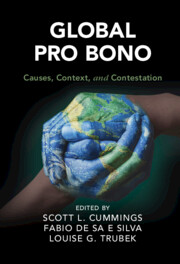Book contents
- Global Pro Bono
- Cambridge Studies in Law and Society
- Global Pro Bono
- Copyright page
- Contents
- Contributors
- Chapter One What Is Global about Pro Bono and What Is Global Pro Bono About?
- Part One The Americas
- Part Two Europe
- Part Three OCEANIA
- Part Four Africa
- Part Five Asia
- Chapter Fifteen The Evolving Contours of Private Pro Bono Policy and Practice in India: Local and Global Contexts
- Chapter Sixteen “Pro Bono” in Singapore: Importing, Adopting, Transforming
- Chapter Seventeen The Rise of Private Public Interest Lawyers in China
- Index
- Cambridge Studies in Law and Society
Chapter Sixteen - “Pro Bono” in Singapore: Importing, Adopting, Transforming
from Part Five - Asia
Published online by Cambridge University Press: 06 May 2022
- Global Pro Bono
- Cambridge Studies in Law and Society
- Global Pro Bono
- Copyright page
- Contents
- Contributors
- Chapter One What Is Global about Pro Bono and What Is Global Pro Bono About?
- Part One The Americas
- Part Two Europe
- Part Three OCEANIA
- Part Four Africa
- Part Five Asia
- Chapter Fifteen The Evolving Contours of Private Pro Bono Policy and Practice in India: Local and Global Contexts
- Chapter Sixteen “Pro Bono” in Singapore: Importing, Adopting, Transforming
- Chapter Seventeen The Rise of Private Public Interest Lawyers in China
- Index
- Cambridge Studies in Law and Society
Summary
Singapore is a common-law country in Southeast Asia known for its impressive economic development, the presence of government in many aspects of daily life, and its no-nonsense approach to crime and criminal procedure. Lawyers, referred to as advocates and solicitors, are not self-regulated, although they carry out most stages of the disciplinary process. The Law Society advocates for lawyers’ interests, and it has statutory duties such as maintaining and improving standards of conduct and learning, and assisting the public in matters related to law. Admission of domestic lawyers to the Singapore bar is overseen by the Supreme Court, and the main subsidiary legislation for professional conduct, the Legal Profession (Professional Conduct) Rules 2015, is overseen by a multistakeholder body known as the Professional Conduct Council (PCC). In Singapore, the government is prominent in the law landscape, and it plays a major role in access to justice by funding legal aid, and together with Singapore organizations such as the Law Society Pro Bono Services and the Community Justice Centre, promoting and encouraging pro bono.
- Type
- Chapter
- Information
- Global Pro BonoCauses, Context, and Contestation, pp. 641 - 671Publisher: Cambridge University PressPrint publication year: 2022

